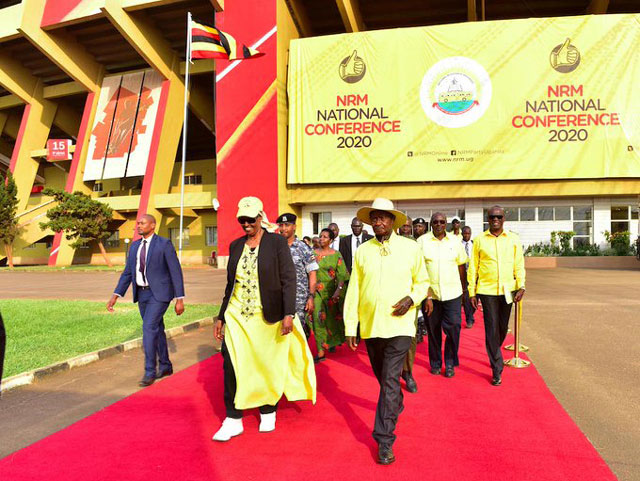
The pros and cons of the President’s long rule and what they portend for the country he has rebuilt
THE LAST WORD | ANDREW M. MWENDA | This week, President Yoweri Museveni and his NRM celebrate 34 years in power. Museveni inherited a country whose state had disintegrated and economy collapsed. The country had been plagued by political instability manifest in military coups and civil wars. In the seven years between the overthrow of Idi Amin in April 1979 and Museveni’s take over in January 1986, Uganda had seven presidents, an average of one president per year. Uganda was so ungovernable the legendary Lee Kuan Yew of Singapore once said it could not recover even in 100 years.
Museveni’s takeover was, therefore, a moment of great hope. Blood had been shed, lives lost, educations sacrificed, careers abandoned, families left behind, and properties destroyed; all in the hope of building a free, democratic and prosperous country. This mood of optimism was reflected in Museveni’s promise that NRM’s takeover was “not a mere change of guard but a fundamental change in the politics of our country.” Looking at how much many elite Ugandans have grown despondent with his rule, it is easy to conclude that the revolution has been betrayed. Indeed, many of Museveni’s contemporaries have since quit the NRM and written stinging criticism of the president.
Yet this column is a sympathetic reflection on the passions that animated NRM’s struggle and the exaggerated expectations many Ugandans had in it. Indeed, it is apparent that Museveni, like so many other politicians of post independence Africa, grossly underestimated the challenges of managing a poor country. He equally overestimated his personal capability and that of a revolutionary party and the state as agents of social change. If Museveni has failed to realise many of his dreams and those of his admirers, it is because his ambitions and their expectations were unrealistic. Yet it would be unfair to say that Museveni has been a failure. On the contrary I think that on balance he has been one of the most successful and influential leaders of post-colonial Africa.
Museveni’s greatest achievement was to stabilise the political dispensation. This is reflected in three critical areas where Uganda’s state fragility was most reflected: incessant military coups and civil wars. Museveni ended these and reestablished the state’s monopoly over the exercise of violence. This allowed him to build a stable and continuous presidency that has lasted nearly three and a half decades. To achieve these aims, Museveni took effective personal control over the security apparatus and disciplined the army, making it subordinate to his personal will. He also ensured good relations with the western powers (much about this later), and established some degree of individual freedom.
Yet Museveni did not bring about a “fundamental change in the politics of our country.” Instead he mastered the art of patronage backed by a good dose of repression. His management of power relations, therefore, has been largely the same as other African leaders of old such as Mobutu of former Zaire, Daniel arap Moi of Kenya, Omar Bongo of Gabon etc. This is largely because patronage and repression are, across time and space, tested and proven methods of managing power relations in poor, backward agrarian societies. Indeed today’s Western liberal democracies managed power relations in similar fashion when they were still poor and agrarian like many African nations of today.
Museveni’s second greatest achievement has been to initiate economic growth and to sustain it over 34 years. Uganda’s economy has grown at an annual average rate of nearly 7% during his presidency, making it among the best performing economies in the world. GDP has expanded from under US$4 billion (after correcting for distortions engendered by the official exchange rate that existed in 1986 and then adjusting this to inflation) to US$34 billion today. That is a performance few nations across time and space have registered over such a long period.
 The Independent Uganda: You get the Truth we Pay the Price
The Independent Uganda: You get the Truth we Pay the Price



For his economic shortcomings, these economic disasters can best be viewed like a situation where the patient dies after a successful operation! One thing the musevenis gotta admit is that the revolution is a spectacular failure. You can’t put it better honest Enterprise has been effectively crowded out. Just view the top 100 taxpayers ten years ago. Thanks.
Great analysis on M7 rule Andrew. It has been a long time since I praised any idea you put in here but I think all credit is due. M7s refusal to leave power will be his own undoing. All the benefits he brought to Uganda will come to nought. Just look at his compatriot in Angola. This is what M7 fears and this will what will be his end.
1. A bird in hand is worth two in the bush;For now Ugandans are still better off under the NRM Regime.Do we have another alternative? we dont for now actually; the youth of Uganda with their Representative Bobi Wine have really embarrassed themselves before the world( i just dont know where to begin from)
2.90% of the food, drugs,textile,leather,plastic,electronics,sanitary ware,construction materials that Ugandans consume are manufactured in Uganda .The wives and children of Ejakaakit and and Rajab wear clothes made in Uganda which is a good thing.
3.Andrew really loves his African women we thank him for sharing a link that recognized Uganda women as one of the most enterprising in the world although there are some women who embarrass us can you imagine some women are paid 2000/=for sex and taken to to lodges on bicycles.
One more failure, that is catastrophic. Tribalizing the elite forces that guard the presidency. Museveni’s tribesmen contribute over 80% of the SFC, the presidential guard. Even if they were highly educated, I do not see how they do not mutiny the leadership of another president who isn’t a Muhima. This is recipe for disaster. Perhaps you have not mentioned this in your column because the former boss is your good friend, and as such you hold hopes similar to those of people close to him, in a post Museveni era.